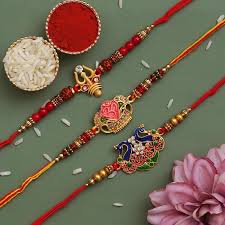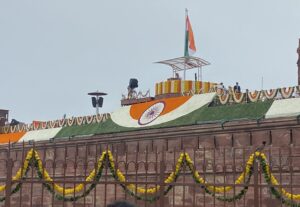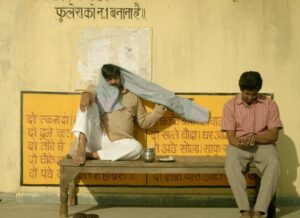Raksha Bandhan, one of India’s most cherished festivals, is a vibrant celebration of the sacred bond between siblings. Observed annually on the full moon day of the Hindu month of Shravan (typically in August), this festival transcends religious and cultural boundaries, symbolizing love, trust, and mutual protection.
In 2025, Raksha Bandhan will be celebrated on August 9, bringing families together to honor the unique relationship between brothers and sisters.
This article explores the origins, significance, rituals, and modern evolution of Raksha Bandhan, highlighting its enduring relevance in fostering familial ties.
Historical and Mythological Origins
The term “Raksha Bandhan” derives from Sanskrit, meaning “the bond of protection.” Its roots lie in ancient Indian traditions, with references in Hindu mythology and historical anecdotes that underscore its significance. Several legends are associated with the festival:
- Draupadi and Lord Krishna: One of the most popular stories comes from the Mahabharata. When Krishna injured his finger, Draupadi, the wife of the Pandavas, tore a piece of her sari to bandage his wound. Touched by her gesture, Krishna promised to protect her in times of distress. He fulfilled this vow during Draupadi’s disrobing in the Kaurava court, miraculously extending her sari to preserve her dignity. This tale symbolizes the protective bond Raksha Bandhan celebrates.
- Queen Karnavati and Emperor Humayun: A historical anecdote involves Queen Karnavati of Mewar, who sent a rakhi to Mughal Emperor Humayun, seeking his protection against invaders. Moved by the gesture, Humayun rushed to her aid, though he arrived too late to save her. This story highlights the festival’s historical role in forging alliances and bonds beyond family.
- Yama and Yamuna: Another mythological tale involves the god of death, Yama, and his sister, the river goddess Yamuna. When Yamuna tied a thread on Yama’s wrist, he granted her immortality, symbolizing the eternal bond between siblings.
These stories, blending mythology and history, emphasize Raksha Bandhan’s core theme: a promise of protection and love.
- Postal Index Number (PIN): A Cornerstone of India’s Postal System
- Raksha Bandhan: Celebrating the Bond of Love and Protection
- The Independence of India: Struggle, Sacrifice, and Triumph
- Earthquakes: Causes, Effects, and Preparedness
- OnePlus: Revolutionizing the Smartphone Industry with Innovation and Value
Significance of Raksha Bandhan
Raksha Bandhan is more than a festival; it is a celebration of emotional bonds. Traditionally, it reinforces the sibling relationship, where a sister ties a rakhi—a sacred thread—on her brother’s wrist, symbolizing her love and prayers for his well-being. In return, the brother pledges to protect and care for his sister, often giving gifts or money as a token of affection. Beyond siblings, the festival extends to cousins, close friends, and even communities, symbolizing mutual respect and care.
The festival also carries a broader social message, promoting harmony and unity. In a diverse country like India, Raksha Bandhan transcends caste, creed, and religion, with people from various backgrounds participating in the ritual. It underscores values of trust, loyalty, and familial duty, resonating deeply in Indian culture.
Rituals and Celebrations
Raksha Bandhan is marked by heartfelt rituals that bring families together:
- Preparation: On the morning of Raksha Bandhan, sisters prepare a thali (plate) with a rakhi, roli (vermilion), rice grains, a diya (lamp), and sweets. Both siblings often dress in traditional attire, adding to the festive spirit.
- Tying the Rakhi: The sister performs an aarti (ritual prayer) for her brother, applies a tilak (mark) on his forehead with roli and rice, and ties the rakhi on his wrist. She prays for his long life and prosperity, while the brother vows to protect her.
- Exchange of Gifts: The brother offers gifts, money, or blessings to his sister, symbolizing his gratitude and commitment. Sweets like laddoos, barfi, or kheer are shared, enhancing the festive joy.
- Family Gatherings: Families come together to celebrate, often with feasts and shared memories. In some regions, community events or fairs are organized, adding a social dimension to the festival.
The rakhi itself varies from simple cotton threads to ornate designs with beads, pearls, or even gold and silver, reflecting personal and regional preferences.
Regional Variations
Raksha Bandhan is celebrated with slight variations across India. In North India, particularly in states like Uttar Pradesh, Rajasthan, and Punjab, the festival is a major event, with vibrant markets selling rakhis and sweets. In Maharashtra, it coincides with Narali Purnima, where fishermen offer coconuts to the sea god Varuna. In South India, the festival is observed with similar rituals but may be less prominent, often integrated with other local traditions. In some communities, like the Jains and Sikhs, Raksha Bandhan is celebrated with equal fervor, emphasizing universal siblinghood.
Modern Evolution and Global Reach
In contemporary times, Raksha Bandhan has evolved to reflect changing social dynamics. Sisters now tie rakhis to not only biological brothers but also cousins, friends, or even neighbors, symbolizing a broader sense of protection and camaraderie. In urban areas, eco-friendly rakhis made of sustainable materials have gained popularity, reflecting environmental consciousness.
The festival has also gone global, with the Indian diaspora celebrating it in countries like the United States, Canada, and the United Kingdom. Online platforms have made it easier for siblings separated by distance to exchange rakhis and gifts, with e-rakhis and virtual celebrations gaining traction. In 2025, technology continues to bridge gaps, with video calls and online rakhi deliveries ensuring the tradition thrives.
Raksha Bandhan has also inspired social initiatives. In recent years, campaigns have encouraged tying rakhis to soldiers, frontline workers, or even trees (as part of environmental drives), symbolizing protection for those who serve or sustain society.
Challenges and Criticisms
While Raksha Bandhan is widely cherished, some critiques highlight its patriarchal undertones, as the traditional narrative emphasizes a brother’s role as a protector. Modern interpretations counter this by focusing on mutual care, with brothers and sisters equally supporting each other. The commercialization of the festival, with expensive rakhis and gifts, has also drawn criticism, prompting calls to return to its emotional essence.
Conclusion
Raksha Bandhan remains a timeless celebration of love, trust, and protection, weaving together mythology, tradition, and modern values. It strengthens familial bonds and fosters a sense of community, making it a cherished part of India’s cultural tapestry. As families gather on August 9, 2025, to tie rakhis and share sweets, the festival will continue to symbolize the enduring power of relationships in an ever-changing world. Whether through a simple thread or a heartfelt gesture, Raksha Bandhan reminds us that love and protection are universal values that bind us all.














Leave a Reply